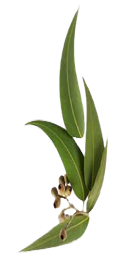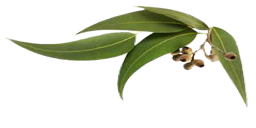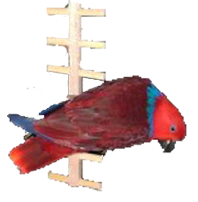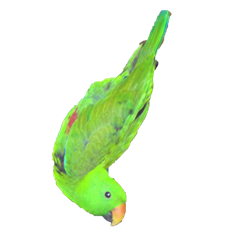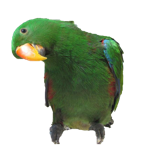Establishing Dominance over anything seems to be the norm for what humans to want to do and expect. So they also expect all creatures are the same. Parrots are not. These birds have no interest in dominance and often have their behaviours either misunderstood as dominance or labeled as it is convenient for us to label a behaviour we don’t understand.
Be the boss...Anyone who develops this sort of attitude towards their parrot may be asking for more trouble than they asked for.
So what about dominance? In the wild it has not been proven that dominance exists in parrots. Flocks of parrots are simply just families socialising. They do everything together, rarely if ever fight and never dominate over one another. Just because we as humans believe in dominance ourselves and because it is in some animal species, it doesn’t mean it exists in every animal species. We think dominance brings us orderly therefore it’s got to exist in all species including parrots.
What about biting? Most times birds bite out of fear. It is their only means of defence. They’re prey in the wild and their instinct to bite for protection will never go. Just imagine a giant hand approaching you that you’re not familiar with. What would your instinct be? To kick it, hit it, run....Parrots in captivity need to learn to trust their humans. Once full trust is established the biting can stop. As long as they bite their humans out of fear they don't trust their humans. They can also bite if they’ve been startled.
Birds can bite if being naughty too. They all go through a “testing” stage where they will see how far they can push you before you break. I call it the “you can’t tell me what to do!” stage, it’s also known as the terrible twos in some parrots. This is completely normal in juvenile parrots and this kind of biting can often be mistaken for dominance. Adopted or rescued adult parrots also go through this stage in a new home. It is simply establishing house rules rather than hierarchy, what they can & can’t do, not dominance. Establishing who they are or where they are within a house hold is not dominance. We all need to know where we are within a household. Routine and house rules sort this out pretty quickly.
Jealousy and anger. If you decide to bring home a new bird in the house and you give this bird all the attention and forget about the one you have had for a couple of years, of course it’s going to be upset & lash out at you and the new bird. This bird was number 1 in the house and suddenly has been put on the back burner. If this happened to you, how would you feel? Jealous? Angry? Putting the older bird first in the house does not establish dominance. It just lets the older bird know that even though there is a new comer the old bird has not been forgotten and is still loved. This prevents jealousy.
Territorial issues. Another often mistaken for dominance. Parrots can be cage territorial, especially through hormonal and breeding stages. This is perfectly normal behaviour in both wild and captive birds. It is a natural instinct for parrots who've found the ‘perfect’ breeding spot and protect it with their life. Even if your captive parrot doesn’t or has never bred, the instinct is always their during hormonal times. The cage makes the perfect breeding spot since it is safe, has an endless supply of food and water and everything the parrot needs, therefore it’s instinct is to protect this site from anyone, no matter who you are.
Aggression in parrots can come for many reasons. Why should they be any different to us with their feelings? They can wake up on the ‘wrong side of the bed’, they can be irritated by too much noise, bullies, children, not getting enough attention, hormones, itchy skin during heavy moults, incorrect diets can also cause aggression , the list can go on...but there is always a reason for the aggression and since they cannot express themselves the way we can, it’s up to us to learn their body language, figure out why they’re angry and sort out the situation before it gets out of hand. We have to read their minds and read their body. Reading any birds body language comes with experience and willing to sit and observe your bird. The first time you get your bird it can be very hard to pick up on their feelings but once you’ve had them a few months & have observed them in that time you start to see yourself being able to pick up on moods and feelings with body language. Some birds are harder than others though.
A parrot that bites when you try to remove it from a higher perch or your head is not displaying dominance. It’s just telling you it does not want to step up or leave the perch, your head or the cage. The bird is probably just enjoying the view. If a bird does not want to do what you want it to do then don’t force the issue. Sometimes they have bad mornings or days and prefer to stay in their cage a few more minutes to be alone. They’ll let you know when they’re ready to come out.
Parrots will always show an aggressive side to them at some stage but it has nothing to do with dominance and everything to do with the way they’re treated, you react to them and their moods and feelings.
Shoulder rides and aggression. “Don’t allow your bird to sit on your shoulder or it will dominate you by biting”. My birds ride my shoulder. If you offer your shoulder to a bird in a bad mood then beware, you will get bitten! Some people insist on never allowing a bird larger than a cockatiel or conure to shoulder because of the risk of being bitten. Some swear by larger birds not being trusted on the shoulder and others have no trouble at all with larger birds riding the shoulder. This is a personal choice.
Parrots don’t care who is superior and who isn’t. They aren’t interest in being superior either. They’re only interested in your undivided attention & FUN. It is often easier for humans to say their parrot is dominant rather than looking at the real issue which is often human error. It is very unfortunate for the birds that many humans refuse to admit thye're at fault when something is going wrong. None of us are perfect 'parronts' but a lot of us don’t like to admit if there is a problem, instead we try to do a quick fix by labelling a behaviour and going, ‘oh well, that’s what they do’.
Rather than trying to stop dominance in a bird that doesn’t exist or trying to enforce yourself as having dominance over your bird to ‘gain control’, try and see things form another perspective. How would you react when you’re forced to do something you really don’t want to do. How do you react to people when you’re in a bad mood, tired or something has just happened to make the day a little worse. How would you feel when you’ve been thrown into a situation with people you have never met before and you don’t what you’re supposed to be doing. Parrots are no different, they have these days with us too and it’s up to us to earn the parrots trust, reinforce good behaviours instead of concentrating on trying to dominate them.
What about those parrots higher up in trees than the rest of the flock? Those parrots are the more nervous ones out of the flock. They stay on the highest point of a tree not because they’re ‘boss’ but because they have chosen to keep on the look out for predators. They scream and take flight first because they’re the first to see the predator. Others hear the alert call and quickly follow. They don’t follow the flock leader, they follow because they don’t want to be eaten themselves! This behaviour has absolutely nothing to do with dominance. This behaviour is normal and only the most nervous and alert bird in the flock keeping a lookout on the highest point while the rest, play or eat. Being at the highest point gives the bird an advantage of being able to look out for predators better than the rest of the flock. This behaviour is very well known in wild in cockatoos and cockatiels.
So what about those in captivity? Parrots are wild, they always have been and always will be. This has been established by all parrot experts as well as parrot owners. We’ve never been able to domesticate them like the dog or cat. Some specialists believe years of human interaction and captivity has taught dominance within captive bred birds. If this is true then why isn’t the parrot domesticated. If we are able to establish dominance within captive bred parrots over some years, they would not still be wild today. They would more than likely be a domesticated pet.

